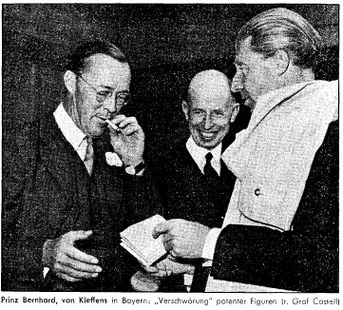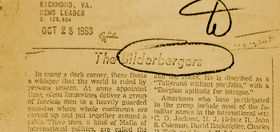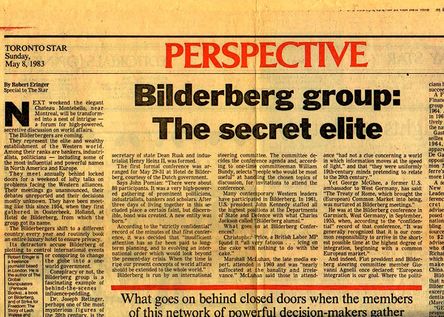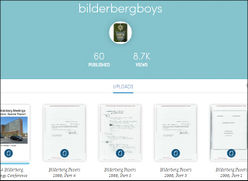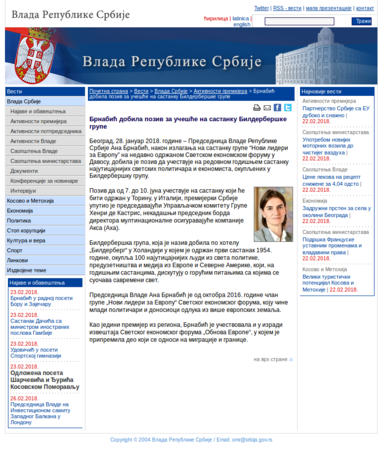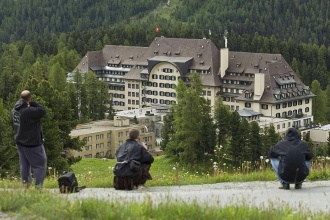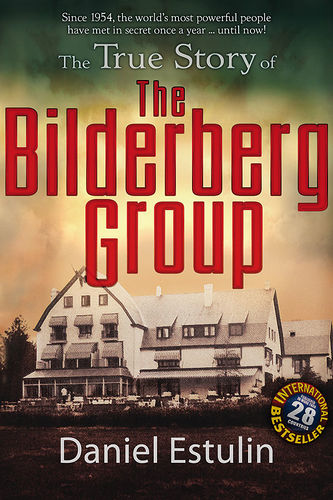Bilderberg/Exposure
(Exposure) | |
|---|---|
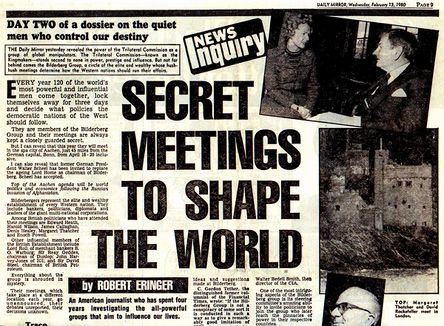 A rare piece on the group byThe Daily Mirror, 13 February 1980, before the 1980 Bilderberg | |
| Particularly since the popularity of the WWW, the Bilderberg group has become more widely known, though commercially-controlled media generally continues to misdirect about the group. |
The Bilderberg has been exposed to the extent that nowadays it is much less attractive as a deep state milieu. This website has a page for each of the 3117 currently known Bilderbergers for whom documentary evidence of their attendance is known.
Concluding his article in The Guardian in 2017, Charlie Skelton remarked that “When Donald Trump refuses to take questions on a given subject, it’s an outrage. And rightly. Bilderberg gave its last press conference in the mid-1970s. They’ve been fighting the war on information for far too long. It’s time for them to lay down their arms, enter the 21st century, and start talking.” [1]
Contents
History
For most of its life, the Bilderberg was shrouded in a high level of secrecy (although not as much as another deep state milieu, Le Cercle). When asked in March 1998 in the UK Parliament, UK Prime Minister Tony Blair denied that he or any members of his government had ever attended a Bilderberg meeting.[2] With the rise of internet use, this secrecy has proved untenable. In a more candid moment, Blair later admitted attending the conference, terming it a "really useful group".[3]
Timeline
Bilderberg guest lists are replete with editors and journalists of the Western commercially-controlled media, which has began a pretty effective news blackout about the group. Although as this page shows, individual items were published about the group, these represent a very tiny fraction of the corporate media output. Until the internet democratised publication, very little has been brought to the attention of the general public about the group. Only in the 21st century is the importance of the group in shaping the history of the 20th century becoming widely appreciated.
1950s
In October 1955, Der Spiegel carried a major report on the "secret conference" of the "Bilderberg circle", even terming it a "conspiracy" (in quotes). It reported on attendees and the discussions. The group was also mentioned in 1957 and 1959 in the New York Times.[4]
1960s
In 1963, James P. Lucier wrote a short piece entitled The Bilderbergers, which caused some concern in the group. Curtis J. Hoxter was tasked with determining how the article got published.[5]
In March 1964, the New York Times wrote in the obituary of George Nebolsine that "Mr. Nebolsine was an original member of the Bilderberg Group, which was founded by Prince Bernhard of the Netherlands to discuss with public and private leaders important political and economic issues."[6]
In 1964 Phyllis Schlafly published A Choice, Not An Echo, which suggested that the US Republican Party was controlled by the Bilderberg group.[7]
1970s
The Argus-Press published an article on the group on June 21, 1974.
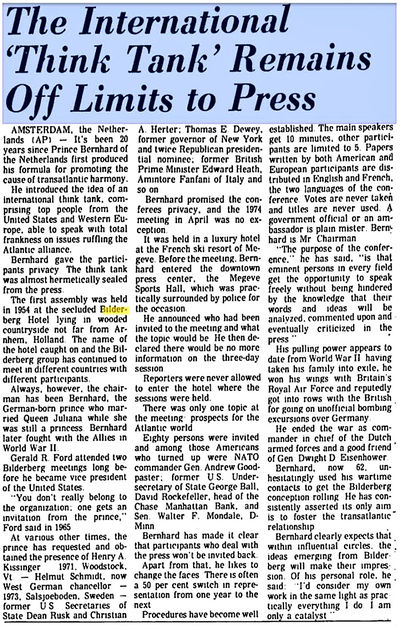
In 1975, C. Gordon Tether wrote in the Financial Times that "If the Bilderberg Group is not a conspiracy of some sort, it is conducted in such a way as to give a remarkably good imitation of one." He was fired in 1976 by his editor, Max Henry Fisher.[8]
In 1977, Yves Mourousi mentioned the Bilderberg group for the series Actualités of the French TV channel TF1, a report by the journalist Dominique Bromberger.
| A TF1 report about the Bilderberg group from 1977 - possibly the last such report on the network |
1980s
On 13 February 1980, the UK newspaper the Daily Mirror published a piece by Robert Eringer entitled Secret Meeting to Shape the World. On May 8, 1983, the Toronto Star published a report of his entitled 'Bilderberg group: The secret elite'.
1990s
According to the American Free Press, it was a result of The Spotlight's discovery that the 1994 Bilderberg would be in Helsinki, and their subsequent appeal to European readers for publicity to the commercially-controlled media that the 1994 Bilderberg had "extensive press and broadcast coverage that stunned Bilderberg luminaries" and that "Bilderberg has suffered extensive coverage in Europe since."[9]
In 1996, dissident ex-BBC journalist Tony Gosling "set up a website with the first lists on the web of participants at the Bilderberg meetings".[10]
The location of the 1997 Bilderberg was leaked in April in The Portman Papers.[11]
In 1999, Tony Gosling registered the domain name Bilderberg.org, which he went on to use to expose the group. On 15 November 1999, the Big Issue published an article by Gibby Zobel on the Bilderberg.[12]
2000s
In the early days of the rise of the WWW, a small number of independent activists (most notably Tony Gosling of Bilderberg.org) made efforts to research and expose the group.
2009
In November 2009, the domain BilderbergMeetings.org was registered, at which a limited hangout website was created, posting the group's meeting schedule and agendas. It has not posted any meeting reports, and their agendas have at least one difference with the agendas as published in those reports.
2010s
Charlie Skelton reported on the group for The Guardian, after which time other members of the UK commercially-controlled media also reported on it.
In 2010 Willy Claes said on Belgian radio that each Bilderberg participant is given a report and they are "considered to use this report in setting their policies in the environments in which they affect".[13]
Internet
The internet proved an effective tool after campaigning journalists such as Jim Tucker and Tony Gosling (who registered Bilderberg.org)[14] worked hard to publicise it. Guardian reporter Charlie Skelton started regularly reporting on the group in 2009 with an article entitled "Our man at Bilderberg: in pursuit of the world's most powerful cabal" in which he wrote that "a handful of people are saying, this weekend is Bilderberg".[15] By 2010, a lot of the secrecy surrounding the group had been eroded and other commercially-controlled media sources were reporting from the meetings. In 2011, BBC acknowledged a changing of the official narrative about the group, artfully entitling an article Bilderberg mystery: Why do people believe in cabals? - reframing the "mystery" associated with the group to speculation about the mental health of people who question its toxic nature.[16]
bilderbergboys
Beginning around 2014, a user named bilderbergboys began posting Bilderberg reports on Scribd. Markings on the documents indicate that they are from a range of sources, predominantly from library collections and archives.[17] These formed the basis of the material here about the Bilderberg meetings.
Public Intelligence
In 2016, the Public Intelligence website collated a large number of conference reports and miscellaneous associated documentation.[18][19]
Wikispooks
In 2017, Wikispooks collected the available primary sources about the Bilderberg group, and published them at https://wikispooks.com/wiki/Bilderberg. Each of the 6 meetings was given its own page, as well each of the (now 3117) known guests.
2018
- Full article: Bilderberg/2018
- Full article: Bilderberg/2018
The venue of the 2018 Bilderberg conference was established in January 2018, after a press release by the Serbian government.[20] The 2018 meeting was the first meeting known to have been infiltrated by an undercover journalist.
2019
- Full article: Bilderberg/2019
- Full article: Bilderberg/2019
The location of the 2019 Bilderberg conference was unknown until just before the event itself, and guest were extremely tight lipped with Bilderberg watchers.
Activists
Particularly after the reporting of Charlie Skelton, the number of activists who travel to Bilderberg meetings has increased rapidly, to the point where Tony Gosling reports that the parallel 'alternative Bilderbergs' held outside the official meeting have become very valuable networking opportunities. US journalist Jim Tucker of the American Free Press was a particularly devoted watcher of the Bilderberg group. Tony Gosling has run Bilderberg.org, a central portal of information about the group.
Books
Daniel Estulin developed sources within the group over many years, which helped to end some of the secrecy and uncover the misdirection by group members.
Documentaries
- BILDERBERG’$ CLUB - documentary featuring interviews with Jim Tucker, Daniel Estulin, We are Change
- The Bilderberg Group - 2012 documentary by Dan Dicks (pressfortruth.ca)
References
- ↑ https://www.theguardian.com/world/2017/jun/02/bilderberg-secretive-conference-eric-schmidt The Guardian
- ↑ http://www.publications.parliament.uk/pa/cm199798/cmhansrd/vo980330/text/80330w06.htm
- ↑ http://www.youtube.com/watch?v=sQf2-3EiAxs
- ↑ https://www.conspiracyarchive.com/2015/06/26/book-review-bilderberg-fictions/
- ↑ http://www.conspiracyarchive.com/tag/bilderberg/page/2/
- ↑ https://www.nytimes.com/1964/03/25/archives/george-nebolsine-is-dead-at-61-lawyer-in-international-field.html
- ↑ https://www.devonlive.com/news/devon-news/bilderberg-group-day-rulers-world-2902604
- ↑ http://self-realisation.com/grand-illusions/bilderberg/
- ↑ http://americanfreepress.net/what-is-bilderberg/
- ↑ https://wikispooks.com/wiki/User:TonyGosling
- ↑ https://www.bilderberg.org/1997.htm
- ↑ 1999 Bilderberg
- ↑ http://www.theguardian.com/world/blog/2010/jun/09/bilderberg-charlie-skelton-2010
- ↑ http://Bilderberg.org
- ↑ https://www.theguardian.com/world/2009/may/13/in-search-of-bilderberg
- ↑ http://www.bbc.com/news/magazine-13682082
- ↑ http://www.conspiracyarchive.com/2016/06/30/the-bilderberg-papers-more-or-less-than-meets-the-eye/
- ↑ https://publicintelligence.net/bilderberg-archive/
- ↑ https://archive.org/search.php?query=subject%3A%22bilderberg%22
- ↑ http://americanfreepress.net/bilderberg-group-reveals-2018-meeting-date-location/
